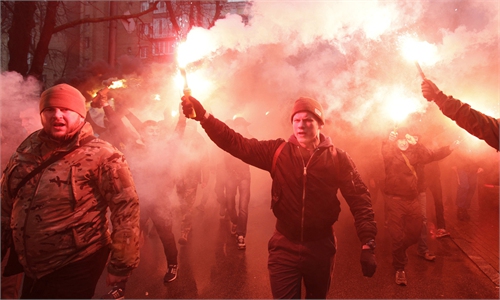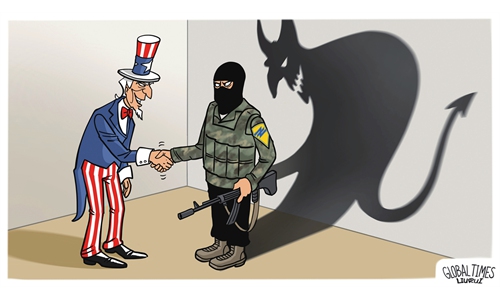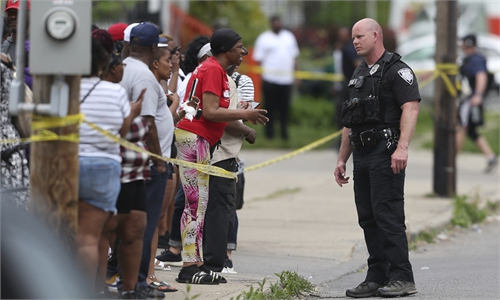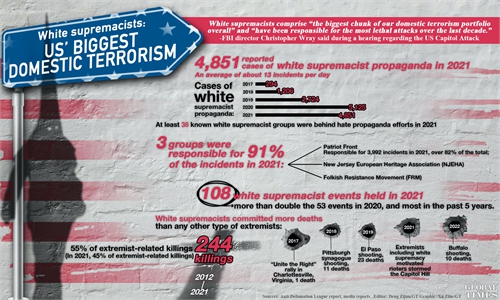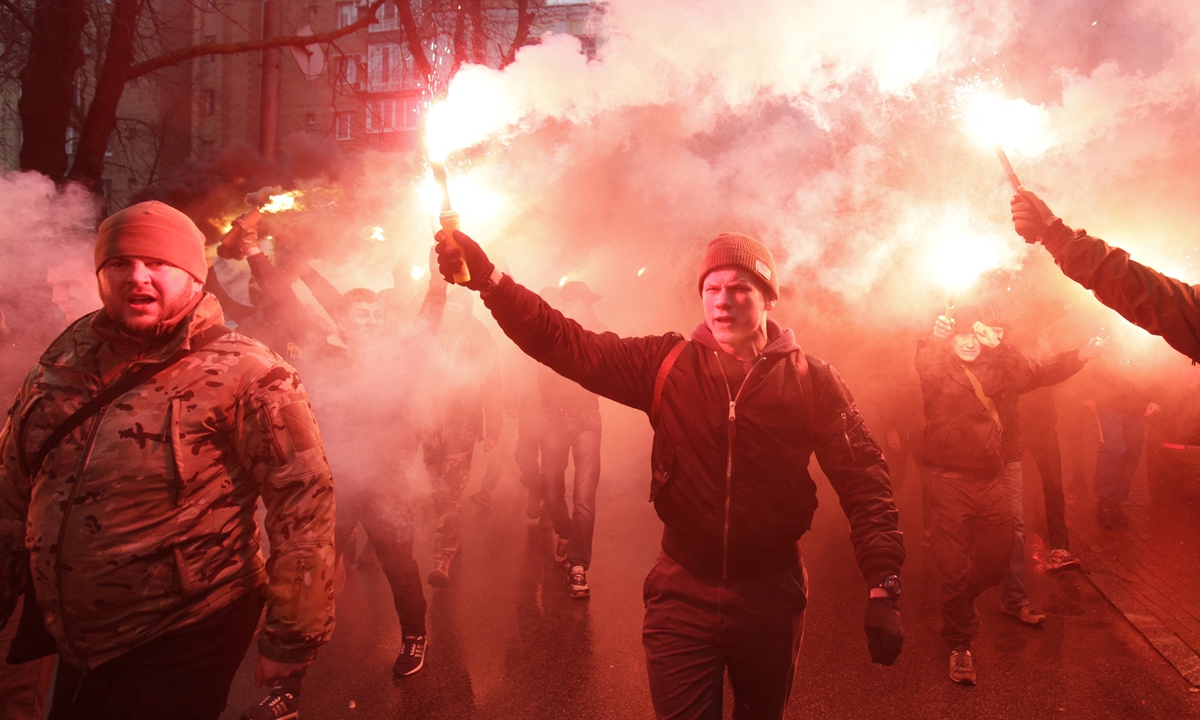
Members of Azov Battalion hold flares during a protest in Kiev on March 1, 2016. Photo: AFP
In the past few decades, "neo-Nazism" deeply entangled with populism and racism, has been growing across Eastern Europe, including Ukraine, under the protection of so-called freedom, democracy and human rights of the West, becoming the poison of society and causing violence, hatred and turmoil.
At the Collective Security Treaty Organization (CSTO) summit on Monday, Russian President Vladimir Putin condemned how neo-Nazism has been rampant in Ukraine. "Unfortunately, this is happening in Ukraine," he said, noting that this situation will eventually affect Western countries' interests, media reported.
On Saturday, a racially motivated shooting which killed 10 people in Buffalo, New York, shocked the world. The killer also left behind a 180-page manifesto outlining the so-called The Great Replacement Theory which reeks of "Nazism."
Experts said that there is no difference between "neo-Nazism" and "Nazism" but there are serious differences between Russia and the West on the definition of "neo-Nazism" in the context of the Russia-Ukraine conflict.
Several experts pointed out that the US is the culprit of the current chaos in Ukraine. The US has deliberately pushed "neo-Nazi" power, but is creating a backlash. "The most pessimistic outcome for the US may be a complete transformation from Tocqueville's America to Mein Kampf's Germany."
Defining "Neo-Nazism"
Discussions about neo-Nazism in Eastern Europe, especially in Ukraine, have culminated with the outbreak of Russia-Ukraine conflict.
Zhang Yifei, associate research fellow at the Chinese Academy of Social Sciences, told the Global Times "There is no difference in essence between Nazism and neo-Nazism, and it is only a difference in time."
"The basic characteristics of Nazism are totalitarian, racism and mode of war. In contrast, the old Nazism had a cult of leaders, while neo-Nazism may embody a totalitarian cult. Nazism's view of race was primarily anti-Semitic, while neo-Nazism was embodied in 'white supremacy' and opposed to everyone else. Nazism encourages war, and neo-Nazism advocates violence."
He Zhigao, associate research fellow at the Chinese Academy of Social Sciences, held similar views. "Both are evil and extreme political trends and barbaric acts that we condemn and oppose," he said.
Some Western observers believe that many right-wing militias including Azov and Right Sector started to have a foothold in Ukraine after the Crimea crisis in 2014, and some Ukrainians even regard these militias with gratitude and admiration. But "the more extreme among these groups promote an intolerant and illiberal ideology that will endanger Ukraine in the long term," warned scholar Josh Cohen, former project officer of the United States Agency for International Development (USAID), in a commentary published by Reuters in March 2018.
Reports showed that against the background of rising anti-Russia sentiment in Ukraine, the far-right forces in Ukraine began to advocate glorifying the crimes of ultra-nationalists and suppressing the status of the Russian language.
Zhang Hong, a researcher at the Chinese Academy of Social Sciences, told the Global Times that it's worth noting that Russia and the West disagree sharply on the definition of neo-Nazism.
In the context of the Russia-Ukraine conflict, Russia ascribes all anti-Russia stuff as neo-Nazism, he said, noting that it is more appropriate to use anti-globalization populism to define it in East Europe.
The existence of an extreme political thought or political organization is not to be feared; what is feared is that it becomes the mainstream of society, he said. According to him, the extremely xenophobic political forces in Russia are very few now.
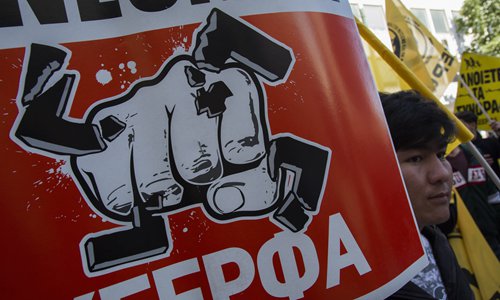
Migrants hold placards and shout slogans against racism and closed borders as well as against the Greek neo-Nazi party Golden Dawn in Athens on March 16, 2019. Photo: IC
Why Eastern Europe?
On May 9, Zelensky reportedly posted a photo of a Ukrainian soldier "with a Nazi insignia." The soldier was alleged to be wearing the "death's head," or "totenkopf," insignia, of the 3rd SS Panzer Division, a unit of elite Nazi soldiers, according to Russia Today (RT).
This was not surprising to American journalist Nebojsa Malich, who noted that in recent months, it is difficult to find a photograph from the Ukrainian (military) that does not have "this or that Nazi symbolism." Such symbols seem to have "penetrated every part of the Armed Forces of Ukraine," Malich noted in a conversation with RT, said news site Teller Report on May 10.
In Ukraine, assaults on gays, Jews, elderly ethnic Russians, and other "impure" citizens are widespread, but local police and official legal authorities "do virtually nothing to prevent these neofascist acts or to prosecute them," said Stephen F. Cohen, professor emeritus of Russian studies and politics at New York University and Princeton University, in an interview by US journal The Nation in May 2018.
Fascist or neo-Nazi revivalism is under way today in many countries, from Europe to the US, but the Ukrainian version is particularly dangerous, Cohen said. "A large, growing, well-armed fascist movement has reappeared in a large European country that is the political epicenter of the new Cold War between the United States and Russia," he pointed out. And worse still, "Kiev is losing control over radical groups."
Why Eastern Europe? Why Ukraine? No matter how to define "Neo-Nazism," this region is always involved.
"Nazism does not belong to one certain country or a region, but caters to many people's dark side," Zhang Yifei told the Global Times. "When Eastern Europe was undergoing the color revolution, the countries were in great chaos, and the people would hope for a capable man to rectify the order, thinking the survival of their race is crucial, and violence is the most direct and efficient method."
In terms of why populism and right-wing concepts are more "popular" in Eastern Europe, Zhang Hong cited an example: Since Poland joined the EU, many Polish doctors, engineers and technicians went to Western Europe to become truck drivers or constructors, but their income doubled. "Western Europe is like a giant vacuum, sucking the development potential of Poland," he said.
"Due to its own technological and industrial disadvantages, Eastern Europe has been more impacted by Western European countries and emerging economies in the process of globalization. During the process of European integration after the Cold War, Poland sold most of its state-owned economy to Western European multinational companies, losing their economic and financial autonomy," Zhang Hong said, noting that this loss has led to the existence of populism in Eastern European countries. "They oppose the encroachment of non-whites on their economic interests. On the other hand, it is also because they are powerless to resist Western Europe."
"The EU under France and Germany engages in energy cooperation with Russia, and the 'Nord Stream 2' bypasses Ukraine, Poland and the Baltic countries, which means that these countries will lose transportation fees without bargaining power. So populism in Eastern European countries takes advantage of the power imbalance between old and new Europe," Zhang Hong said.
In He's view, there are multiple internal and external reasons. Some politicians use extreme populism or even neo-Nazism to gain support. Second, the unbalanced economic development has led to a decline in the income of some groups, who are more likely to be incited, stoking a stronger hatred toward the "winners" of globalized economy and culture.
"Moreover, the historic memory of being under the rule of the Soviet Union intensified these countries' worries on losing their sovereignty and cultural uniqueness, which further provides fertile ground for neo-Nazism to grow," He said.
Connivance of neo-Nazism
The situation is grim in Europe as a whole, as far-right forces had once managed to overpower most of Europe's law enforcement and judicial systems in recent years. That has encouraged the perpetrators of hate crimes to feel emboldened, wrote Turkish author Murat Sofuoğlu in an article published by TRT World in October 2018.
"Under the protection of so-called freedom, democracy, and human rights of the West, political parties with neo-Nazism tendencies are active in Western politics," He said. In recent years, the European economy has declined, unemployment has risen, and the stagnation of development in some countries has intensified more long-standing resentment.
Moreover, He said, with the influx of a large number of refugees, some elites used their frustration to attract low-income groups, low-educated groups and even young people to carefully plan resistance activities, further aggravating internal social conflicts in Europe, and providing neo-Nazism an opportunity.
Yet Europe is ambivalent about neo-Nazis. It has "too few efforts" to develop programs to prevent right-wing extremism," said Cemil Yilmaz, a Dutch-Turkish social psychologist. While the European political class is proactive in dealing with radicalization in minority groups, "the surging right-wing groups that are violent in nature have been ignored," TRT quoted Yilmaz as saying in October 2018.
Yilmaz noted that European media also plays a big role in the rise of far-right movements. "Most of the media professionals are white," who often want to discuss issues related to multiculturalism, ethnicity and identity in an aggressive and biased manner, he added.
He Zhigao said that some European elites and people are indeed more and more tolerant of neo-Nazism, and they are even happy to see neo-Nazism, through violence, to achieve unspeakable interests and policy proposals. "As 'Nazi' is a sensitive word, Europe often calls neo-Nazism a 'far-right force,' which has contributed to the arrogance of neo-Nazism."
"Far-right populism does not fully equal neo-Nazism," He noted.
Although Europe has clear legal order for neo-Nazism, neo-Nazism could often be able to circumvent the law, either in the name of patriotism, a legal name, or a hidden form, which assured neo-Nazism to poison European society and to harm people of other races.
Why is neo-Nazism rampant in Eastern Europe? Gideon Rachman, foreign affairs columnist for the Financial Times (FT), pointed out that although the official US line is that it aims to help Ukraine "resist Russian aggression," there are also influential voices in Washington, London and other capitals who now "see an opportunity to push Russia off the world stage."
"That kind of thinking was reflected in the remarks last month by Lloyd Austin, the US Defense Secretary, that America was now seeking to 'weaken' Russia permanently," wrote Rachman in an FT's opinion piece on May 9.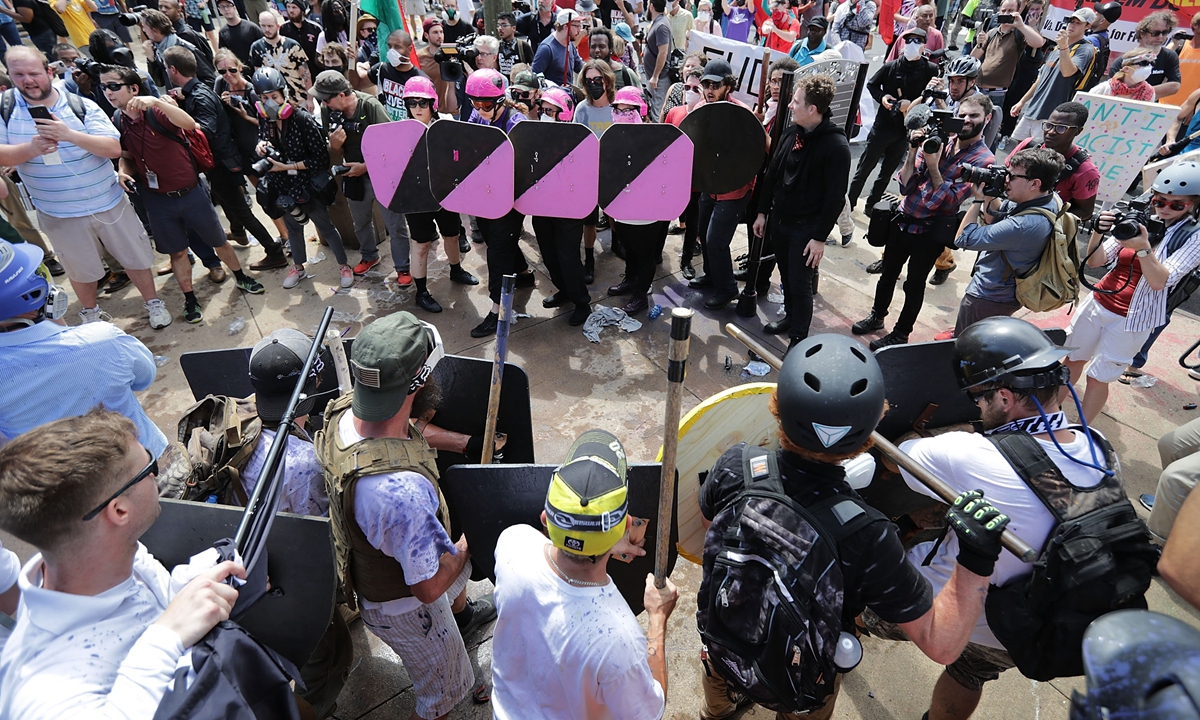
Battle lines form between white nationalists, neo-Nazis and members of the "alt-right" against anti-fascist counter-protesters at the entrance to Emancipation Park during the "Unite the Right" rally on August 12, 2017 in Charlottesville, Virginia. Photo: AFP
Achieving a permanent weakening of Russia would clearly be a big geopolitical win for the West, wrote Rachman in his article "Ukraine and the shadow of the Nazis" published on FT. "It would reduce the security threat to Europe, diminish China's most important ally and give new credibility to President Joe Biden's insistence that 'America is back,'" Rachman noted.
"Who is to blame for the chaos in Ukraine today? It's the US, and the US intends to do so," Zhang Yifei told the Global Times.
Zhang pointed out that the US is a country with deep neo-Nazi soil. "There is an undercurrent of centralized power worship in American society, and once the US has a bad economy, it craves the emergence of leaders with extreme styles like Trump. At the same time, the US is inherently a racist country with 'white supremacy.' On the other hand, the military-industrial complex, especially arms dealers, provides a large number of jobs in the US," Zhang Yifei explained.
Zhang said that neither the Republicans nor Democrats have consensus on neo-Nazism, but they both want to instrumentalize the power of neo-Nazism.
Zhang noted that the US government's attitude toward Germany before World War II was actually exactly the same as the current US policy. "Why did the US indulge Adolf Hitler before World War II, and was even able to give loans to Hitler? Because it hoped that the Nazi forces attack the Soviet Union, and other communist countries. On the other hand, as long as there is a strong Nazi in Europe, Britain and France will not dare to disobey the US," he said.
However, the US calculation will eventually backfire. According to media disclosures, like many previous shootings, the May 14 shooting in Buffalo was carried out by a white supremacist.
"The US will certainly continue to invite trouble if it doesn't step back," Zhang pointed out, noting that more worryingly, the US' neo-Nazi soil is bound to produce a future political strongman. "Perhaps the most pessimistic ending is that the US is completely transformed from the America of Tocqueville to the Germany of Mein Kampf," Zhang said.

